The Civil War in Sudan: Humanitarian Collapse and the Plight of Civilians
Sudan, one of Africa’s largest and most diverse countries, has been plunged into a devastating civil war since April 2023. The conflict—between the Sudanese Armed Forces (SAF) and the paramilitary Rapid Support Forces (RSF)—has triggered a humanitarian catastrophe of historic scale. While the situation differs in nature from the tragedy in Palestine, the suffering of civilians in both crises reflects a similar depth of human loss.
Unlike many other conflicts, Sudan’s war is fought between two powerful factions within the same country. It remains fundamentally political rather than religious; however, with an overwhelmingly Muslim population (estimated at around 97%), the vast majority of those affected are Muslim civilians.
More than two years of fighting have torn families apart, destroyed vital infrastructure, and left millions without food, shelter, or healthcare. According to United Nations reports, over 10 million people have been displaced both inside Sudan and across its borders—one of the largest displacement crises in the world today.
This article offers an overview of the civil war from 2023 to 2025 in Sudan. It traces the origins and progression of the conflict, outlines its humanitarian consequences, analyses the political and military dynamics, reviews the international response, and highlights the lived experiences of ordinary Sudanese Muslims caught in the turmoil. The aim is to present a clear, authentic, and human-centred account of one of the most tragic conflicts of the modern era.
Background of the Conflict
The origins of the current conflict in Sudan can be traced to the country’s turbulent political history. After decades of authoritarian rule under President Omar al-Bashir, mass protests forced him from power in 2019. A fragile transitional government was then formed, including civilian leaders and military figures who promised a path toward democratic reform. However, tensions between the military and civilian leadership emerged quickly.
The two most powerful military figures—General Abdel Fattah al-Burhan, head of the Sudanese Armed Forces (SAF), and General Mohamed Hamdan Dagalo, widely known as Hemedti, commander of the Rapid Support Forces (RSF)—soon became rivals for control of the state.
In October 2021, General Burhan staged a coup, dissolving the transitional government and arresting several civilian leaders. Though he claimed the move would “correct the course” of the transition and eventually restore democracy, it only deepened divisions within the military and alienated much of the population. Meanwhile, the RSF—an outgrowth of the Janjaweed militias involved in the Darfur conflict of the 2000s—continued to rise in power. With control over lucrative gold mines and significant financial backing, it increasingly operated as a parallel army.
When efforts to integrate the RSF into the national military stalled, the rivalry escalated into open warfare in April 2023. The fighting began in the capital, Khartoum, where RSF forces launched coordinated attacks on key military sites. Violence then spread rapidly to other regions, including Darfur, Kordofan, and parts of eastern Sudan.
By mid-2024, both factions had established competing zones of control: the SAF dominated parts of central and eastern Sudan, while the RSF held large areas of Darfur and western regions. This fragmentation has made governance nearly impossible, leaving millions trapped in isolated areas and cut off from essential services.
The conflict also reflects deeper struggles over identity, power, and economic resources. Sudan’s cultural and regional diversity has long been marked by grievances between Arabized elites and historically marginalised non-Arab communities. Allegations of RSF attacks on non-Arab Muslim groups in Darfur have revived fears of ethnic cleansing, echoing the atrocities of the early 2000s.
In this sense, the civil war is not only a political crisis but also a social catastrophe rooted in unresolved historical injustices.
Humanitarian Genocide and Impact on Muslims
The humanitarian consequences of Sudan’s civil war are staggering. Nearly half of the country’s roughly 50 million people now require humanitarian assistance. Markets, hospitals, schools, and transport networks have been destroyed, leaving millions dependent on aid that often cannot reach them due to ongoing fighting. More than 18 million people face severe food insecurity, with several regions already experiencing famine-like conditions. In parts of North Darfur, many families survive on a single daily meal—often made from wild grains or leaves. Starvation has become widespread, especially among children. UNICEF warns that over three million children are acutely malnourished, and at least 700,000 are at risk of dying without urgent intervention.
Civilians—farmers, traders, parents, children—bear the brunt of this catastrophe. Sudan’s social fabric, long shaped by Islamic traditions of community care and generosity, has been shattered. Entire Muslim villages have been burned, and numerous mosques have been destroyed. In Darfur, non-Arab Muslim communities such as the Masalit have faced mass killings and displacement. In early 2025, the U.S. government stated that RSF-aligned militias had carried out genocidal attacks in parts of Darfur. Eyewitnesses describe horrific scenes: men killed in front of their families, women subjected to sexual violence, and children separated from their parents as they fled burning homes.
Beyond the direct violence, the collapse of health and education systems has deepened the suffering. More than 80% of hospitals in conflict-affected areas are non-functional. Outbreaks of cholera, measles, and malaria have spread rapidly due to the lack of clean water and sanitation. Religious charities and local Muslim aid groups—traditionally central to community welfare—have been forced to suspend their work due to insecurity. Ramadan and Eid, once seasons of joy and communal gathering, have become periods of grief in many regions. In displacement camps, imams now lead prayers over rows of graves for those who died from hunger or disease.
International aid agencies continue to struggle amid extreme danger. Humanitarian convoys are frequently looted, and aid workers have been targeted by both the SAF and RSF. The World Food Programme (WFP) has reported multiple attacks on its warehouses, resulting in the loss of thousands of tonnes of food supplies. As both sides use access to aid as a weapon of war, millions remain unreachable.
The suffering of Sudan’s Muslims, therefore, is not only the outcome of armed conflict—it has been intensified by deliberate military and political strategies that restrict food, healthcare, and humanitarian relief.
Political and Military Developments
The military landscape in Sudan has shifted significantly since the conflict began. Early in the war, the RSF gained the upper hand in urban centres such as Khartoum, using mobility and guerrilla-style tactics. The SAF, relying heavily on artillery and air power, responded with intense bombardments that devastated entire neighbourhoods. Civilians found themselves caught between both sides, with many forced to flee to save their lives. By early 2024, the frontlines had largely stabilised due to the effective division of the country: the RSF maintained control over most of Darfur and parts of Khartoum, while the SAF held eastern regions.
Foreign involvement has further complicated the conflict. Reports indicate that Egypt and Iran have provided material support to the SAF, while the RSF is believed to have received assistance from the United Arab Emirates and elements of Russia’s Wagner Group. In addition, the RSF’s control over parts of Sudan’s gold trade offers a substantial financial base. This external intervention risks turning Sudan into a proxy battleground, prolonging the war and undermining prospects for peace.
Politically, both factions claim to represent Sudan’s legitimate authority. The SAF, operating from Port Sudan, asserts that it is defending the country’s unity. The RSF, meanwhile, portrays itself as a force representing historically marginalised regions. However, both sides have been accused of war crimes, abuses, and corruption. Civilian pro-democracy groups—once central to Sudan’s political transition—have been sidelined or silenced. International mediators, including the African Union and the United States, have facilitated multiple rounds of ceasefire talks, particularly in Jeddah, Saudi Arabia, but none have produced meaningful progress.
This stalemate has devastated Sudan’s administrative and economic structures. Civil governance has collapsed, and regional authorities often operate independently with minimal coordination. The economy has broken down: inflation has soared to over 250 percent, the Sudanese pound has sharply devalued, and salaries for civil servants—including teachers and doctors—remain unpaid. The failure of national institutions has created space for armed groups and criminal networks to thrive, especially in border regions where weapons and goods flow freely.
Sudan now faces the risk of total state failure, with the absence of a unified authority threatening the stability of the entire Horn of Africa.
International Response and Challenges to Peace
International organisations, mediators, and governments have responded to the situation in Sudan with concern, yet their effectiveness has been limited. Bodies such as the United Nations, the African Union, and the Arab League have repeatedly called for ceasefires and humanitarian corridors. Neighbouring countries—including Egypt, Chad, and South Sudan—have attempted to support the millions of refugees fleeing the conflict. More than 1.5 million Sudanese refugees are now sheltering in eastern Chad, many living in tents without adequate food, medicine, or basic services.
Within the United Nations Security Council (UNSC), debates over intervention have been intense, but geopolitical divisions have prevented decisive action. Western governments have imposed sanctions on individuals accused of violence, while Gulf states have attempted to mediate between the warring factions. However, overlapping political interests have weakened collective efforts. The UN’s ability to deliver aid inside Sudan remains severely restricted due to insecurity and limited resources.
Human rights groups have urged the International Criminal Court (ICC) to investigate alleged atrocities and crimes against humanity committed by both sides. The ICC prosecutor has warned that, if substantial evidence continues to emerge, senior leaders in both the SAF and RSF could face prosecution. Yet justice remains distant: both factions retain significant power and have resisted international pressure. Meanwhile, the overwhelming humanitarian crisis—marked by famine, disease, and mass displacement—often overshadows the urgent need for political accountability.
Global religious institutions, including major Muslim organisations, have expressed solidarity with the Sudanese people. Appeals for duʿāʾ, charity, and fasting have circulated widely, especially during special occasions. However, without safe access and sustainable funding, even widespread global concern has limited practical impact.
The central challenge for the international community remains how to transform moral support into meaningful, coordinated action that advances peace and recovery for Sudan.
Voices from the Ground: Stories of Survival
Behind the political reports lie the personal stories of people facing unimaginable hardship. In a camp near Nyala, a mother named Fatima recounts how her village was burned in the fighting. Her husband was killed, and she walked for three days with her two children in search of safety. She says, “We had nothing to eat except wild fruits. We pray for peace, but every night we still hear gunfire.”
In another camp in North Darfur, a 14-year-old boy named Ahmed volunteers to distribute food to displaced families. He once dreamed of becoming a doctor, but the school he attended was destroyed. “When the planes bombed, I ran and never saw my friends again,” he says quietly. His experience reflects the shattered futures of thousands of Sudanese children and teenagers whose education and safety have been taken from them.
Imams and community leaders continue to nurture hope, with Friday prayers often becoming the only gathering that brings people together in several camps. Many religious leaders speak about patience, faith, and steadfastness, reminding displaced Muslims that resilience is part of their spiritual duty. Local women’s groups form communal cooking teams whenever food arrives, ensuring that even strangers are fed. Despite the overwhelming hardship, these acts of solidarity reveal the strength and compassion of Sudanese communities.
Aid workers echo similar sentiments. A Sudanese nurse serving with the Red Crescent says, “We are running out of supplies, but not out of compassion.” Her words represent thousands who risk their own safety to help others. Their courage remains a small but steady light in an otherwise dark chapter of human history.
About the Author
Rabiul Alam, from West Bengal, is a PG scholar in the Department of Civilizational Studies at Darul Huda Islamic University, Kerala.
References
Centre for Strategic and International Studies, (2024), Conflict, hunger, and famine in Sudan. https://www.csis.org/analysis/conflict-hunger-and-famine-sudan
OCHA, (2024), Sudan humanitarian response plan 2024. United Nations Office for the Coordination of Humanitarian Affairs. https://www.unocha.org/publications/report/sudan/sudan-humanitarian-needs-and-response-plan-2024-december-2023
Reuters, (2024, September 27), Famine is ravaging Sudan, but the world can’t get food aid to millions of starving people. https://www.reuters.com/investigates/special-report/famine-aid-sudan/
UNICEF, (2025, October 12), Food and nutrition crisis deepens across Sudan as famine identified in additional areas. https://www.unicef.org/press-releases/food-and-nutrition-crisis-deepens-across-sudan-famine-identified-additional-areas
United Nations News, (2025, March 28), UN warns of ‘catastrophic’ humanitarian crisis in Sudan’s Darfur. https://news.un.org/en/story/2025/10/1166028
U.S. Department of State, (2025, January 7), Genocide Determination in Sudan and Imposing Accountability Measures. https://2021-2025.state.gov/genocide-determination-in-sudan-and-imposing-accountability-measures/
World Food Programme, (2024, December 5), Sudan emergency report. https://www.wfp.org/search?search_api_fulltext=Sudan%20emergency%20report&f%5B0%5D=year%3A2024
Disclaimer
The views expressed in this article are the author’s own and do not necessarily mirror Islamonweb’s editorial stance.

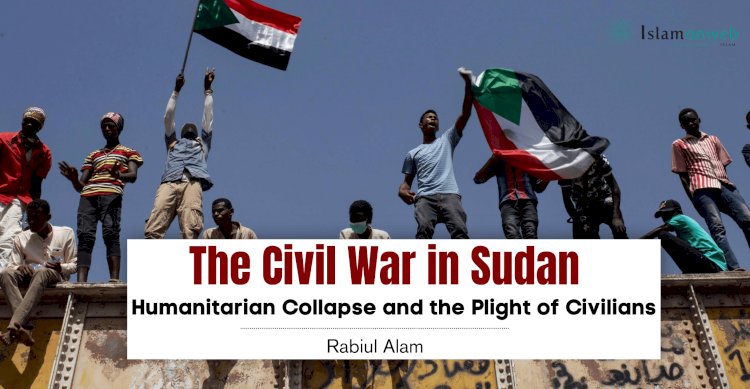


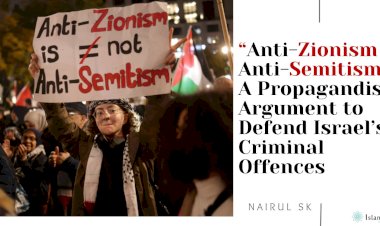
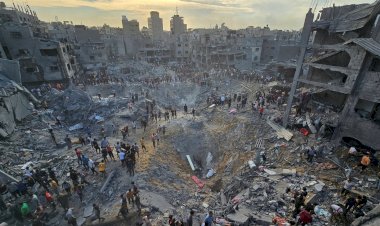
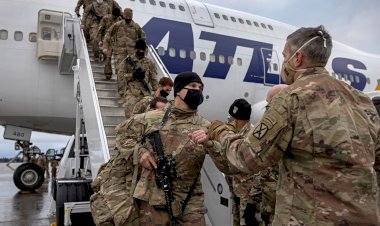

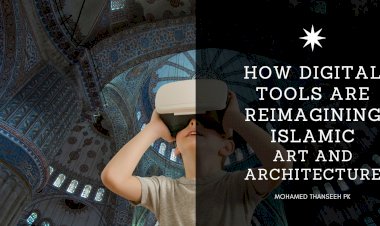
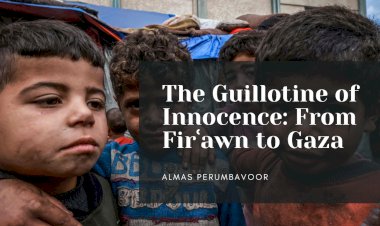














Leave A Comment